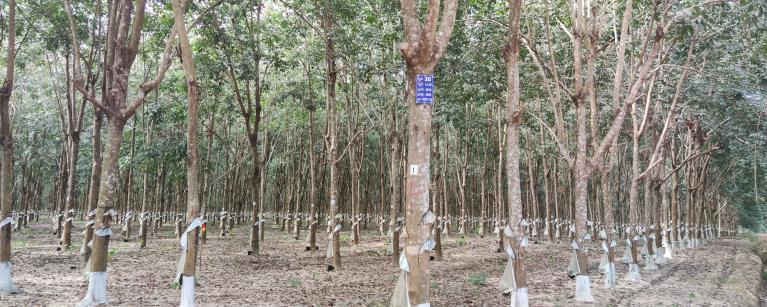Oxfam, in partnership with the General Department of Rubber of the Ministry of Agriculture, Forestry and Fisheries, organized the “Rubber Business Forum” on December 22, 2023, in Svay Rieng province.
This forum aimed to foster a sustainable and mutually beneficial partnership between small-scale rubber producers, agro-industry companies, manufacturers, policymakers, and development partners. The event brought together various stakeholders, including small-scale rubber producers, family rubber farmers’ associations, manufacturers, and development partners. The objective was to enhance mutual understanding of manufacturers’ requirements and standard demands, thereby building trust among all parties and fostering sustainable partnerships. This forum marked the first time that development partners and stakeholders actively engaged in in-depth discussions to identify joint strategies and address the root causes of problems in the rubber industry.
The manufacturing sector, especially tire factories, has experienced significant growth, with investments in building factories in Svay Rieng, Sihanoukville, and Kratie provinces. However, the rubber supply chain for the manufacturing sector faces challenges, including a lack of comprehensive discussions and interactions regarding information on the source of supply and quality requirements from manufacturers. In addition to the forum, participants had the opportunity to visit RMKH Glove (Cambodia) and CART TIRE to gain insights into the production chain and finished products of these factories.
Oxfam commended the General Department for its exceptional efforts in organizing the forum and providing opportunities for small and medium-sized suppliers and families to actively participate. This engagement enabled them to develop a comprehensive understanding of the manufacturing sector’s requirements and align their rubber production accordingly.
H.E. Pal Sopha, Undersecretary of State at the Ministry of Agriculture, Forestry and Fisheries, acknowledged the disruption in the rubber production chain caused by the lack of communication between suppliers and producers. He emphasized that factories have continuously been established and pledged to use 100% local raw materials in the future. However, the absence of information regarding quality standards has created a barrier between producers and processors. Therefore, this forum holds significant importance as the first gathering of its kind in Cambodia’s rubber industry.
Recognizing the existing challenges and the extensive scope of the rubber sub-sector’s needs, H.E. Pal Sopha called for continued cooperation from development partners to comprehensively address this problem and foster stronger connections between suppliers and manufacturers.
Oxfam, in collaboration with partners and stakeholders, has been actively working towards promoting a more efficient, sustainable, and environmentally friendly rubber production chain in Cambodia. As part of these efforts, Oxfam has developed the Sustainable Natural Rubber Guideline for Cambodia, aimed at ensuring responsible practices throughout the industry.
